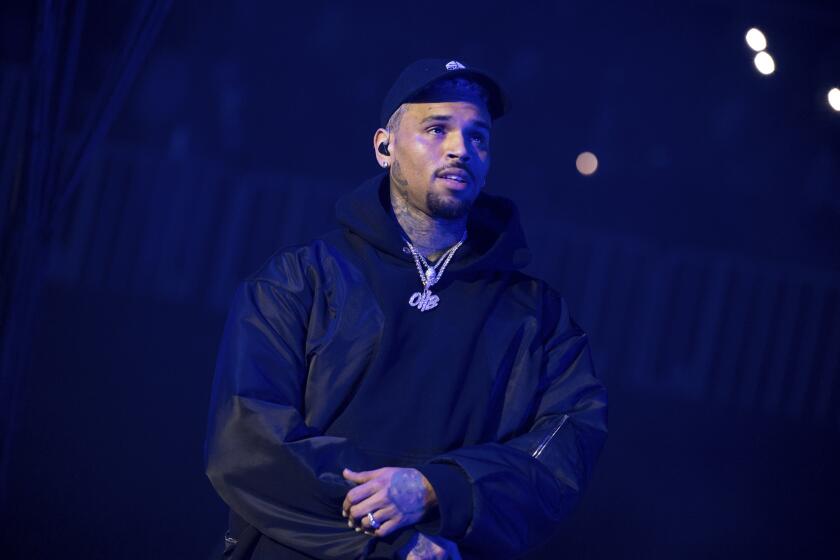Out on a high note
- Share via
The lesson of the Ray Charles tribute concert Friday at Staples Center surely would have made Charles smile knowingly: If you want great soul music, you’d better call on a great soul man.
Fortunately, Al Green answered that call with an electrifying rendition of Charles’ 1959 classic “What’d I Say” that brought an exhilarating surge to an otherwise uneven evening.
Racing onstage as fast as a bronco out of a rodeo chute, Green jumped into the number with both feet -- literally.
“What’d I Say” is R&B;/soul at its most dynamic; a lustful lyric propelled by one of the most sensual and magnetic grooves ever captured on record.
And Green, whose own captivating soul hits include “Tired of Being Alone” and “I’m Still in Love With You,” spent as much time dancing as singing about how that girl with a diamond ring sure knows how to shake that thing “alright now, hey, hey.”
It was the moment during the 90-minute program that most reflected the liberating burst of emotion that was part of the “genius” of Charles, who died in June at 73.
It alone is reason enough to check out “Genius: A Night for Ray Charles,” which CBS will air at 9 p.m. Oct. 22.
There were other engaging segments, but there were also distractions that may mar the telecast as well.
There were danger signs about the program from the start.
The core cast was impressive: Elton John, Stevie Wonder, B.B. King, Norah Jones, Mary J. Blige, Usher and Green.
But there was also the foul odor of compromise that often accompanies TV tributes -- chiefly some performers and/or presenters chosen more with an eye for TV demographics than for their talent or relevance.
Adding to the sense of unease was that the show also smelled of a promo for “Ray,” the upcoming motion-picture biography starring Jamie Foxx as Charles.
Foxx, predictably, was the evening’s host, and Tom Cruise, his co-star from “Collateral,” was on hand to join Foxx at the microphone. He assumed the role of amateur film critic -- giving thumbs-up to Foxx and the film (“brilliant,” “stunning”).
Even so, things got off to a strong start with Elton John and Blige teaming on a gutty, grinding version of one of Charles’ earliest hits, “(Night Time Is) The Right Time.”
Blige is one of the most beloved figures in hip-hop/soul, and she brought a rawness and power to the tune that stepped beyond her normally more restrained approach.
On this number and others, the singers were backed by a band that featured musicians who worked with Charles and who played arrangements used by the late singer. That meant “Night” reflected Charles’ familiar aggressive female vocal backing, slashing horns and dynamic percussion.
But things went flat in a hurry as country singer Kenny Chesney turned in a pedestrian version of “You Don’t Know Me,” one of the key songs in Charles’ brilliant merging of country and soul in the ‘60s.
Chesney is one of country’s hottest singers these days, so he will probably help lure viewers to the special, but there were many better choices to represent country on the show.
One of those better choices wasn’t Reba McEntire, who later sang the Don Gibson song “I Can’t Stop Loving You,” which was one of Charles’ signature hits. Her rendition was so void of character or drama that you would never know it was a song of heartbreak.
Her performance was all the more disheartening in light of the loving spirit that Stevie Wonder brought to “I Gotta Woman,” the controversial early-’50s tune that boldly mixed gospel and secular currents.
Norah Jones followed Wonder with another ‘50s hit, “Drown in My Own Tears,” and her sensitive, restrained vocal felt so true to the spirit of Charles that you could imagine him singing along in your head.
A tuxedoed Usher showed courage in taking on the challenge of “Georgia on My Mind,” and he did reasonably well, though he hasn’t near the vocal character to enable him to match Charles’ absorbing, original treatment.
And so it went: Elton John returning for another country standard, “Born to Lose,” keyboardist-singer Billy Preston delivering “Unchain My Heart,” young British pop-jazz singer Jamie Cullum putting plenty of zest into “Hallelujah I Love Her So” and Blige back for a vigorous “Come Rain or Come Shine.”
Bringing all this talent together was a considerable accomplishment in itself, so there may not have been time for the musicians to have given the evening a more distinctive tone by working out more duets, a la John-Blige.
Bruce Willis, another celebrity presenter, sat in with B.B. King on a blues workout, but thankfully, Willis didn’t try to relaunch his ill-fated singing career. He simply played harmonica.
One of the most engaging moments of the event, which raised money for the Ray Charles Robinson Foundation for Hearing Disorders, was when Charles’ old friend, record producer Quincy Jones, talked between songs about their days together.
It was so heartfelt that you wished the time given to TV-movie personalities between songs had been reserved for Jones and others who worked with the great singer and pop visionary. In fact, that was lesson No. 2 on Friday: When dealing with something as pure as soul music, the tired showbiz formula feels all the more hollow. Brother Ray would probably nod knowingly about that too.
Robert Hilburn, pop music critic for The Times, can be reached at Robert.Hilburn@ latimes.com.
More to Read
The biggest entertainment stories
Get our big stories about Hollywood, film, television, music, arts, culture and more right in your inbox as soon as they publish.
You may occasionally receive promotional content from the Los Angeles Times.










